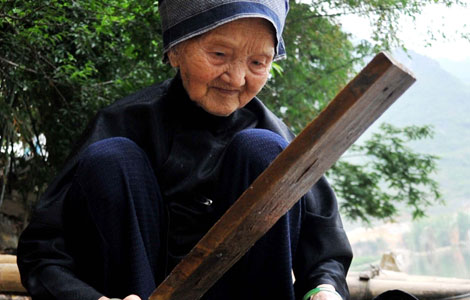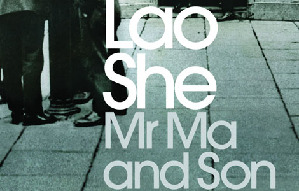The write experience
Updated: 2013-09-09 10:32
By Matt Hodges (China Daily)
|
|||||||||||
Their de facto task: To acclimatize to Shanghai's frenetic pace of life and idiosyncrasies and, hopefully, be inspired. Whether they like it or not, they are unlikely to avoid certain rites of passage along the way. Misconceptions are also likely to have a short shelf life.
Mexican poet and novelist Lina Zeron was already ahead of the pack within 24 hours of leaving Pudong International Airport.
"I got lost this morning and walked in the wrong direction for one hour. A Chinese lady found me in the park and tried to walk me home, but then she got lost, too," she says.
Claiming to have read exhaustively about China before arriving, she says the abundance of short skirts and exposed flesh left her reeling.
"They say that girls here are repressed," she says, rolling her eyes.
"But I think maybe it's even more (relaxed) here than in Mexico."
Bewildered by the barrage of neon signage, she ate her first dinner at Starbucks. She then provided a checklist of headaches commonly encountered by foreigners: Taxi drivers pretending you are invisible, problems communicating in English and so forth.
"I'm going to write about my experience here: 'Big Brother, Writers in Shanghai'," she punned, making a reference to the popular reality TV show about mismatched housemates that launched in 1999 and has since become a global franchise.
Joao Tordo, the only Portuguese author among finalists for the sixth European Union Prize for Literature last year, is putting the final touches on his seventh book. Tordo, who almost always sets his novels in different cities, says Shanghai's labyrinthine nature, unfathomable social codes and Olympic-level language barrier are actually blessings in disguise.
"As a writer, being able to go somewhere and get lost is precious," says Tordo, who is visiting Asia for the first time.
"Shanghai reminds me of New York, maybe back in the '70s, but run by people who follow a totally different set of rules. I'm so sick of big cities where everything is so planned, organized and boring. It's great to be here."
Although the 7-year-old program has not yet born particularly luscious fruit - Sun says previously invitees mostly wrote about their experiences in essay form - the organizers view it as a pioneering endeavor that is growing in scale and stature every year.
"Before we started this, we didn't have a writer's residency program in China," Sun says.
"We also hope it encourages reciprocal exchanges, thus giving hope to our young writers."
Certainly, more Chinese writers are either winning or being shortlisted for literary prizes in recent years.
Jiang Rong claimed the inaugural Man Asian literary prize in 2007 with his illuminating Wolf Totem, which is being made into a film directed by Jean-Jacques Annaud. Su Tong won the same prize in 2009 for his political fable The Boat to Redemption, about a playboy government official who castrates himself. And Bi Feiyu made it a hat-trick in 2011 when he claimed Asia's top literary prize for his "cultural revolution" (1966-76)-era Three Sisters.
For the first time this year, the association is co-hosting the program with the dramatic arts center. This facilitated some memorable performances from both foreign and native writers on Monday evening.
Germain Droogenbroodt, a Flemish poet born in Belgium, recited some of his works while a Chinese woman provided accompaniment on a Spanish guitar. Later, a middle-aged Chinese man performed a moving rendition of a local work that touched on themes of memory, loss and death.
For Irish novelist Denyse Woods, the program has enabled her to rededicate herself to the craft of fiction writing on a subsidized sojourn in an exciting new milieu.
"Today's the start of my new life as a real writer again," she says.
"I certainly look forward to writing about Shanghai and setting a story here."
Droogenbroodt, whose poems are infused by Chinese philosophy, says he will give lectures and recitals at venues like Fudan University. Lamenting what he perceives as the loss of traditional "roots" in modern China, he says: "I'm not at all nationalistic, but where people should be nationalistic, if at all, is in preserving their own cultural beauty. There is too much American influence on modern Chinese poetry."
Wang says exchanges with foreign writers also help local authors understand other cultures and avoid embarrassing social faux pas or literary gaffes.
"We're always trying to better our understanding," she says.
| Shandong's inky heart |
Related Stories
To know the ethnic groups, read their prose 2013-08-27 14:21
Niche literary leader 2013-08-27 09:54
Ghost writer 2013-08-06 09:27
Capturing Beijing through the viewfinder 2013-07-17 18:30
Popular novelist tries hand at big screen 2013-06-26 01:28
Young writers step up 2013-06-25 10:13
Today's Top News
August economic data suggest recovery
China, Hungary sign currency swap deal
Global rules to govern Net sought
Official calls for improved elevator safety
Russia, China not competitors in Central Asia
China, Uzbekistan to deepen energy cooperation
China becomes 3rd-largest investor
Region urged to facilitate tourism
Hot Topics
Lunar probe , China growth forecasts, Emission rules get tougher, China seen through 'colored lens', International board,
Editor's Picks

|

|

|

|

|

|







